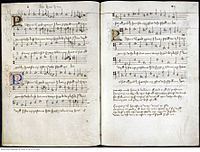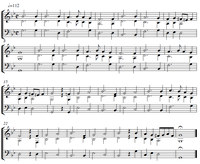
Thomas Wolsey was an English statesman and Catholic cardinal. When Henry VIII became King of England in 1509, Wolsey became the king's almoner. Wolsey's affairs prospered and by 1514 he had become the controlling figure in virtually all matters of state. He also held important ecclesiastical appointments. These included the Archbishop of York—the second most important role in the English church—and that of papal legate. His appointment as a cardinal by Pope Leo X in 1515 gave him precedence over all other English clergy.

Jethro Tull are a British progressive rock band formed in Blackpool, Lancashire, in 1967. Initially playing blues rock and jazz fusion, the band soon incorporated elements of English folk music, hard rock and classical music, forging a signature progressive rock sound. The group's lead vocalist, bandleader, founder, principal composer and only constant member is Ian Anderson, who also plays flute and acoustic guitar. The group has featured a succession of musicians throughout the decades, including significant contributors such as guitarists Mick Abrahams and Martin Barre ; bassists Glenn Cornick, Jeffrey Hammond, John Glascock, Dave Pegg and Jonathan Noyce; drummers Clive Bunker, Barrie "Barriemore" Barlow and Doane Perry; and keyboardists John Evan, Dee Palmer, Peter-John Vettese and Andrew Giddings.
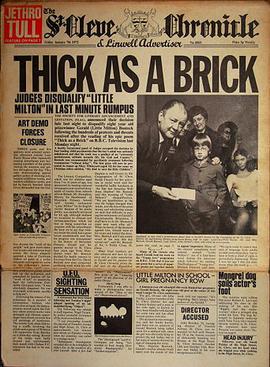
Thick as a Brick is the fifth studio album by the British rock band Jethro Tull, released on 3 March 1972. The album contains one continuous piece of music, split over two sides of an LP record, and is intended as a parody of the concept album genre. The original packaging, designed as a 12-page newspaper, claims the album to be a musical adaptation of an epic poem by fictional eight-year-old genius Gerald Bostock, though the lyrics were actually written by the band's frontman, Ian Anderson.
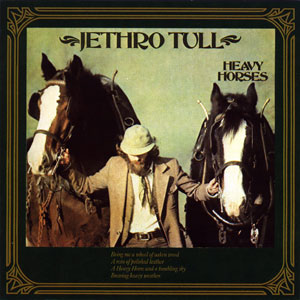
Heavy Horses is the eleventh studio album by British progressive rock band Jethro Tull, released on 10 April 1978.

A Passion Play is the sixth studio album by British progressive rock band Jethro Tull, released in July 1973 in both the UK and US. Following in the same style as the band's previous album Thick as a Brick (1972), A Passion Play is a concept album comprising individual songs arranged into a single continuous piece of music. The album's concept follows the spiritual journey of a recently deceased man in the afterlife, exploring themes of morality, religion and good and evil. The album's accompanying tour was considered the high water mark of Jethro Tull's elaborate stage productions, involving a full performance of the album accompanied by physical props, sketches and projected video.

Ian Scott Anderson is a British musician best known for his work as the singer, flautist, acoustic guitarist, primary songwriter, and sole continuous member of the rock band Jethro Tull. He is a multi-instrumentalist who also plays harmonica, keyboards, bass guitar, bouzouki, balalaika, saxophone and a variety of whistles. His solo work began with Walk into Light in 1983; since then he has released another five albums, including the sequel to the 1972 Jethro Tull album Thick as a Brick, titled TaaB 2: Whatever Happened to Gerald Bostock? (2012).

Stand Up is the second studio album by British rock band Jethro Tull, released in 1969. It was the first Jethro Tull album to feature guitarist Martin Barre, who would go on to become the band's longtime guitarist until its initial dissolution in 2012. Before recording sessions for the album began, the band's original guitarist Mick Abrahams departed the band as a result of musical differences with frontman and primary songwriter Ian Anderson; Abrahams wanted to stay with the blues rock sound of their 1968 debut, This Was, while Anderson wished to add other musical influences such as folk rock.

Dave Pegg is an English multi-instrumentalist and record producer, primarily a bass guitarist. He is the longest-serving member of the British folk rock band Fairport Convention and has been bassist with a number of folk and rock groups including the Ian Campbell Folk Group and Jethro Tull.
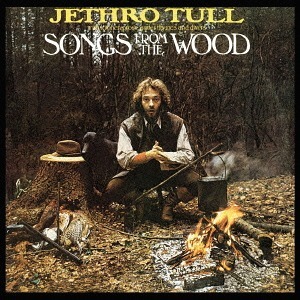
Songs from the Wood is the tenth studio album by British progressive rock band Jethro Tull, released on 11 February 1977 by Chrysalis Records. The album is considered to be the first of three folk rock albums released by the band at the end of the 1970s: Songs from the Wood,Heavy Horses (1978) and Stormwatch (1979).

Martin Lancelot Barre is an English guitarist best known for his longtime role as lead guitarist of British rock band Jethro Tull, with whom he recorded and toured from 1968 until the band's initial dissolution in 2011. Barre played on all of Jethro Tull's studio albums from their 1969 album Stand Up to their 2003 album The Jethro Tull Christmas Album. In the early 1990s he began a solo career, and he has recorded several albums as well as touring with his own live band.

Crest of a Knave is the sixteenth studio album by British rock band Jethro Tull, released in 1987. The album was recorded after a three-year hiatus caused by a throat infection of vocalist Ian Anderson, resulting in his changed singing style. Following the unsuccessful electronic rock album Under Wraps, Crest of a Knave had the band returning to a more hard rock sound. The album was their most successful since the 1970s and the band enjoyed a resurgence on radio broadcasts, appearances in MTV specials and the airing of music videos. It was also a critical success, winning the 1989 Grammy Award for Best Hard Rock/Metal Performance Vocal or Instrumental in what was widely viewed as an upset over the favorite, Metallica's ...And Justice for All. The album was supported by "The Not Quite the World, More the Here and There Tour".
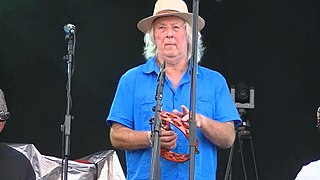
Gerald Conway is an English folk and rock drummer/percussionist, best known for having performed with the backing band for Cat Stevens in the 1970s, Jethro Tull during the 1980s, and a member of Fairport Convention from 1998 to 2022, alongside various side projects. Conway has done a considerable amount of work as a session musician. Conway is married to vocalist Jacqui McShee, who is the singer of Pentangle, a band of which Conway is also a member.

For the English folk song written by King Henry VIII, see Pastime with Good Company.

Paul Burgess is an English rock drummer, notable for his association with a wide range of British rock and folk-rock bands. In addition to extensive session work, he has been an official member of 10cc, Jethro Tull, Camel, Magna Carta, and The Icicle Works.

The Best of Acoustic (2007) is a greatest hits album by Jethro Tull. It includes some of the band's biggest acoustic hits from 1969 to 2007.
Medieval folk rock, medieval rock or medieval folk is a musical subgenre that emerged in the early 1970s in England and Germany which combined elements of early music with rock music. It grew out of the British folk rock and progressive folk movements of the late 1960s. Despite the name, the term was used indiscriminately to categorise performers who incorporated elements of medieval, renaissance and baroque music into their work and sometimes to describe groups who used few, or no, electric instruments. This subgenre reached its height towards the middle of the 1970s when it achieved some mainstream success in Britain, but within a few years most groups had either disbanded, or were absorbed into the wider movements of progressive folk and progressive rock. Nevertheless, the genre had a considerable impact within progressive rock where early music, and medievalism in general, was a major influence and through that in the development of heavy metal. More recently medieval folk rock has revived in popularity along with other forms of medieval inspired music such as Dark Wave orientated neo-Medieval music and medieval metal.

"The Witch's Promise" is a single by the British rock band Jethro Tull, released in January 1970, on the Chrysalis label. It reached No. 4 in the UK Singles Chart, and was promoted by an appearance on the British chart show Top of the Pops. The B-side was "Teacher", an alternate version of which later appeared on the US release of the album Benefit. In the U.S., the single was released on the Reprise label.

"Songs from the Wood" is the title track off of English rock band Jethro Tull's album Songs from the Wood. Written by frontman Ian Anderson, it features a folk-rock style that characterizes the Songs from the Wood album.
"Heavy Horses" is a song written by Ian Anderson and performed by his band Jethro Tull. The song was released on the 1978 album of the same name. Written as a tribute to horses, the song features folk rock elements that rebelled against the musical trends of the period.

"The Whistler" is a song by English rock band Jethro Tull from their 1977 album Songs from the Wood. Written by frontman Ian Anderson, it features a folk-rock style that characterizes the Songs from the Wood album.
